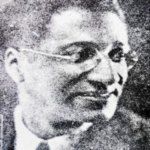VROOM, HENDRICK
- 5 Min Read
Hendrick Vroom (May 20, 1850-January 1902) was one of the outstanding civil servants and diplomats serving the Gold Coast government in its earlier years. After serving as an officer in the Dutch Army and Navy, like other Africans, he transferred his allegiance to the British in 1872. He fought in the Sagrenti War of 1873-74, and was later a district commissioner, and a British ambassador to Asante from 1897-1900.

PHOTO CAPTION: Hendrick Vroom. SOURCE: EA library
He introduced British currency into what is now southern Ghana, helped to delimit the frontier between the Gold Coast and Ivory Coast, and urged certain chiefs and elders to give land for the introduction of railroads to the colony.
Born at Elmina in 1850, the son of Hendrick McCarthy Vroom, a mulatto commandant of the Dutch resident army, and of Amba Abokuma, Vroom was educated and trained first at the Dutch Government School in Elmina castle, and later in the Dutch Navy .
He entered the Dutch West Coast service after leaving the castle school. His first employment was that of assistant schoolmaster in the Castle school under the headmastership of Joe da Costa.
Between 1866 and 1872 he served as a customs officer at Elmina, and was promoted to sub-collector. He served as an officer in the Dutch Army when in 1866 the Fante confederation army besieged Elmina. He later became an officer in the Dutch Navy.
When the Dutch left the West Coast of Africa in 1872, selling their possessions there to the British, Vroom, like many other educated Africans, was transferred to the British service.
Between 1872 and 1880, he served in the British Army. In the Sagrenti War of 1873-74, between the British and their African allies on the one side, and the Asante on the other, Vroom served under the British commander, Sir Garnet Wolsely, and after the war was awarded a medal and a clasp. After the war, his career may be summarised as follows. In 1875 he was the customs officer for Cape Coast; from 1876-86 he was district commissioner from Prampram, 25 mi (40km) east of Accra; from 1886-89 he was district commissioner for the Ahanta-Shama district in the vicinity of Sekondi, and from 1890-97 for the Wassa-Nzima district, in what is now southwestern Ghana.
He was responsible for the introduction of English currency into the coastal towns and villages, when coins replaced cowries and gold dust. The use of English currency subsequently spread to the inland district of the Gold Coast. In 1889 he was the sole commissioner who acted to settle the stool dispute between chief Essel Kojo and Kobena Fabir for the stool of Awudua, about 40 mi (64km) northwest of Sekondi. He urged the chiefs and elders of Sekondi and Wassa to give land for building railway lines, sheds, and stations, so that rail transport could be introduced to the region.
During his tenure as district commissioner, based at Tarkwa, 30 mi (48 km) northwest of Sekondi, a gold rush occurred, and concession-mongers created several problems which Vroom had to solve. He urged the chiefs and elders to lease their lands to the concession-hunters, instead of selling them, and thereby won royalties for them. While serving as the district commissioner at Tarkwa, he also undertook several missions to Asante between 1894 and 1897.
At a time when most of his compatriots were confined to routine jobs in the administration. Vroom was sent on special diplomatic missions not only to Asante between 1894-97, but also to the western border of the colony with the Ivory Coast. The negotiations that Vroom conducted with the Asantehene and his council were perhaps the most crucial of those that took place in Anglo-Asante relations.
The British were planning to occupy Asante, and the negotiations were difficult, because until 1896 the Asante Union, under Prempeh I, was trying to reunite the Asante states of the interior so as to prevent European encroachment and foreign domination. They therefore refused to reply to the offer of British protection made by the British governor, Brandford Griffith, through Vroom, and instead sent an embassy to London to Vroom, and instead sent an embassy to London to seek an audience with Queen Victoria to put forward their case for independence. The Asante mission failed, and Britain occupied Asante in 1896. From 1897-1900 he was British ambassador to Asante, where his instructions were to gauge public feeling. He reported that Asante was unsettled and had not yet acquiesced in British rule.
Earlier in 1893, Vroom had been sent to act as interpreter, as well as being a member of the western boundary commission to help in the delimitation of the Gold Coast frontier with the French. His varied experience led to his appointment for a brief period in 1895 as secretary for Native Affairs, a post which was afterwards, until its abolition, held only by Europeans. In 1896 he was made a Companion of the Order of St. Michael and St. George (C.M.G) for his long and meritorious service to the crown.
Vroom placed his experience at the service not only for the government, but also for individuals and groups of his countrymen. During the 1889 official enquiry in Wassa, his long consultations with the subjects of the chief Enimil Quow, who had been deported to Lagos in Nigeria, showed that he shared their anxieties. He had a particularly difficult task in Asante, since it became the British government’s intention to arrest and send Prempeh I into exile. His life was often in danger, and he was once nearly assassinated when he was returning to the coast from Asante.
In 1901 he became chief commissioner for Cape Coast, but his health began to fail. He died on his return to home in January 1902, before he could take up his appointment as a secretary for Mines.
FRANCIS AGBODEKA



